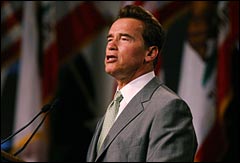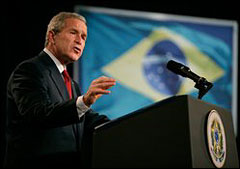
10. A Stern reminder
In October, venerable economist and senior U.K. government adviser Sir Nicholas Stern released a major report on global warming. Its claims were explosive. On the grim side, global warming stands to shave up to 20 percent off the world’s annual GDP by the end of the century. On the bright side, it will only cost 1 percent of the world’s annual GDP to avoid the damage, if we act now.
That’s perhaps history’s largest “if.”
Whether or not Stern’s numbers are ultimately accepted, he smashed once and for all the myth that our choice is between spending money fighting global warming and saving money doing nothing. It turns out doing nothing will cost far more.
9. Takings is leaving
When Oregon voters passed Measure 37 in 2004, supporters of sustainable development despaired. The “regulatory takings” initiative stipulates that Oregon taxpayers must compensate private landowners for any reduction in land value resulting from new rules or regulations. Its passage galvanized the national “property rights” movement, which got initiatives on the ballot in six other states this year, all pushed by deceptive, well-funded campaigns financed primarily by one rich guy.
Five of them failed. And Oregonians have a serious case of buyer’s remorse, lamenting the erosion of some of the nation’s most progressive land-use policies. Voters are wising up to the fact that takings measures tie a community’s hands and leave it subject to landowner extortion. Turns out there’s no “I” in community. Except that one toward the end there.
8. Carbon neutrality is the new black
When the New Oxford American Dictionary chose “carbon neutral” as its word of the year, the nation … didn’t much notice. But it did notice the sudden ubiquity of the idea itself, with everything from the Pearl Jam tour to Al Gore’s movie boasting of its Swissitude. Naturally, the private sector surged to meet the demand, with a new carbon offset company springing up every five minutes (and taking pot shots at each other).
Colleges are doing it. Weddings. Vacations. Big companies. Small companies. Movie stars. The Olympics. Your Aunt Mabel. Pretty soon we’ll all be carbon neutral and then … problem solved, right? Right?

Photo: State of California
7. Grist officially out of punny California headlines
California has always kicked the rest of the nation’s ass on environmental policy. Just the past few years have seen its groundbreaking clean-car bill, its groundbreaking Million Solar Roofs plan, its groundbreaking greenhouse-gas targets, and a whole passel of other bills that broke the ground all to hell.
In 2006, worried that patches of ground remained unbroken, it outdid itself. Assembly Bill 32 authorized the California Air Resources Board to start setting real, actual, tangible, measurable, pinch-me-I-must-be-dreaming emissions limits on specific industries. In addition to setting an example for other states and single-handedly salvaging America’s international reputation on the global warming issue, AB 32 probably saved Arnold’s ass. More Republicans like this, please.
6. Roadless! No, roadful! No, roadless!
The Roadless Rule was one of President Bill Clinton’s last, best, and, ahem, only substantial environmental legacies. It put some 58.5 million acres — nearly a third of national forest land — under protection. Naturally it had to be destroyed. In 2005, President Bush replaced it with a process whereby if governors really wanted to protect their states’ forests from their biggest campaign donors developers, well, they could fill out forms A5, Z9, and Qsub6 — in triplicate, please.
In September 2006, U.S. District Judge Elizabeth Laporte took her ruler and smacked the back of Bush’s hand, putting the RR back in place. She claimed the administration had not conducted proper environmental studies before yanking it … almost implying that — are you sitting down? — they didn’t really care about protecting forests. Dang activist judges.

Photo: U.S. Dept. of State.
5. Hi. My name is the United States of America, and I’m an addict.
A little more than halfway through his January State of the Union speech, otherwise filled with the familiar ham-handed bromides, President Bush said something that had the nation doing a collective double take, rubbing its collective eyes in collective bafflement: “America is addicted to oil.”
OK, when he delivered the line, he probably didn’t know the impact it would have. The oil-reduction goal he offered alongside it was flaccid, and not a week later his energy secretary said even that goal wasn’t meant “literally.” He’s spent his time since cutting spending on conservation, energy efficiency, and alternative energy, pushing to drill every-damn-where, and hyping biofuels and hydrogen, which don’t exactly have Big Oil quaking in its boots. And he’s still BFF with Saudi Arabia.
But still. His words almost instantaneously made conventional bipartisan wisdom out of what had long been a predominately progressive critique. It is now “official,” as evidenced by the quote being cited in approximately 14 quadrillion news stories, op-eds, and press releases since then.
Perhaps next year he’ll mention peak oil, and we can start talking about that too.

Photo: iStockphoto
4. God v. Dobson
In April, support for the cause of fighting global warming came from a surprising source: conservative evangelical Christians. In February, a group of 86 prominent leaders in the movement signed the Evangelical Climate Initiative, which called on the federal government to take urgent action against the threat of global warming.
It was the most public episode in what’s been a building drama among evangelicals, pitting the old guard, which plans to keep flogging gay marriage until the checks stop coming, against the new guard, which is pushing to broaden the agenda to issues that involve fewer clear villains but actual, widespread suffering: global warming, poverty, and AIDS.
The old guard includes such veterans as Chuck Colson and James Dobson, who called global warming a “distraction.” The new guard includes Jim Wallis, Rich Cizik, and kajillion-selling author and mega-church pastor Rick Warren. The old guard is losing members, while the new guard snagged Pat Robertson. Who do you think is winning?

3. America takes Dick out of resources committee
The 2006 mid-term elections were, in the memorable terminology of our Electoral Poison in Chief, a “thumpin’.” Democrats picked up 31 seats in the House and six seats in the Senate, while Republican gains can be expressed in the following equation:
Republican gains in House + Republican gains in Senate x 1 bazillion = zilch.
Enviros lost a few long-time allies on the right side of the aisle, mostly from the endangered species known as Northeastern Republican Moderate (sorry Linc!). But they lost many more nettlesome pains in the ass.
Perhaps the greatest source of green schadenfreude in a decade came with the defeat of Rep. Richard “Dick” Pombo, who used his perch atop the House Resources Committee to wage unremitting war on environmental regulation, all with a smug grin and a thoroughly unforgivable mustache. Adding to the delight: Pombo was beaten by Jerry McNerney, a wind-turbine engineer.
After six years of bleak news on the environmental front, Democratic committee control in both houses of Congress now opens the way for serious action on global warming and energy security. Will they fight like Boxers or prove themselves Dingell-berries?
2. Wal-Mart: America’s leading source of cognitive dissonance
Wal-Mart’s astonishing, almost comically ambitious goal — to produce zero net waste and run entirely on renewable energy — was announced late last year, causing progressive heads to explode across the land. Although the company has continued to suck eggs on labor practices, particularly health-care benefits, it has been plodding steadily toward its sustainability goals, improving the fuel efficiency of its truck fleet, pressuring suppliers to reduce packaging, and filling its shelves with organic food (or at least food labeled organic).
Of course, Wal-Mart’s core business model — importing cheap plastic widgets from overseas to sell in massive stores plonked down in the middle of Nowhere, Suburbia — is inherently unsustainable in an energy-constrained future. But its open embrace of sustainability was just the latest in a string of ambitious corporate initiatives from biggies like Dupont and GE. And that’s to say nothing of the astonishing infusion of private venture capital in green industries like clean energy.
Despite the braying of dinosaur corporations and think-tank nitwits to the contrary, going green is not a drag on the economy. It’s the 21st century’s biggest moneymaker.
1. An inconvenient yet bizarrely popular truth
Environmental issues, particularly global warming, have enjoyed a historically high profile this year, and it’s difficult to overstate the amount of credit that goes to one man: Al Gore.
His improbable documentary An Inconvenient Truth — one quarter biography, three quarters, um, slide show — has become the third-highest grossing documentary of all time, with the highest per-screen average of any documentary ever. It looks likely to win an Academy Award.
Again: a slide show.
The movie, and subsequently the book, opened the floodgates. There were news specials, congressional hearings, Jay Leno appearances, Oprah appearances, Daily Show appearances, public debates, and kitchen-table conversations. So-called “skepticism” about climate change retreated to rear-guard battles, and the debate over what to do about it got started.
In 2006, green (to use a cliché I hope does not survive into 2007) became the new black.
Thanks, Al.


